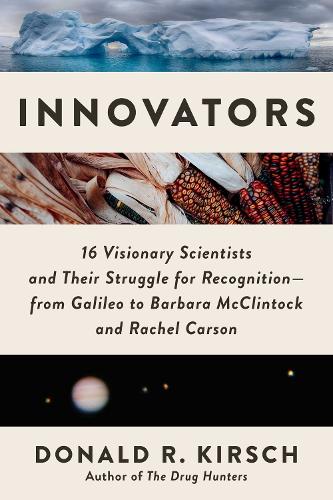
Innovators: 16 Visionary Scientists and Their Struggle for RecognitionFrom Galileo to Barbara McClintock and Rachel Carson
(Hardback)
Publishing Details
Innovators: 16 Visionary Scientists and Their Struggle for RecognitionFrom Galileo to Barbara McClintock and Rachel Carson
By (Author) Donald R. Kirsch
Skyhorse Publishing
Arcade Publishing
14th February 2024
18th January 2024
United States
Classifications
General
Non Fiction
Biography: science, technology and medicine
509.22
Physical Properties
Hardback
360
Width 140mm, Height 210mm, Spine 41mm
454g
Description
Compelling stories of scientific breakthroughs and the great minds behind them
Some of the most significant breakthroughs in science dont receive widespread recognition until decades later, sometimes after their authors death. Nobel Prizewinner Max Planck, whose black-body radiation law established the discipline of quantum mechanics, stated this as what has become known as Plancks Principle, commonly summarized as Science progresses one funeral at a time. In other words, for some truly groundbreaking discoveries, a new consensus builds only when proponents of the old consensus die off. Breakthrough discoveries require a paradigm shift, and it takes time and new minds for the new paradigm to be adopted.
In Innovators, Donald Kirsch tells the stories of sixteen visionary scientists who suffered this fate, some now famous like Max Planck himself, Galileo, and Gregor Mendel, and some less well known. Among them are Barbara McClintock who, working with Indian corn, discovered transposons, as known as jumping genes, which provide a major mechanism driving biological evolution; Rachel Carson, catalyst for the environmental movement; and Roger Revelle, the climatologist whose findings were the first to be described by the term global warming. The breakthroughs cover fields from biology to medicine to physics and earth sciences and include the discovery of prions, life-changing treatments such as drugs for high blood pressure, ulcers, and organ transplantation; the process of continental drift; and our understanding of how molecules form matter.
Author Bio
Donald R. Kirsch,PhD,coauthor of The Drug Hunters, was a drug hunter for more than thirty-five years, holds more than two dozen drug-related patents, has written more than fifty research papers, and has been a reviewer for prestigious scientific journals. He served as a director of neuroscience research at Wyeth, the director of molecular genetic screen design at Cyanamid, the leader of a Research Group in Microbiology and Cell Biology at Squibb Institute for Medical Research, and the Chief Scientific Officer at Cambria Pharmaceuticals. He has taught in the biotechnology department at Harvard Extension School and currently teaches at Columbia University. He lives in Westchester, NY.
